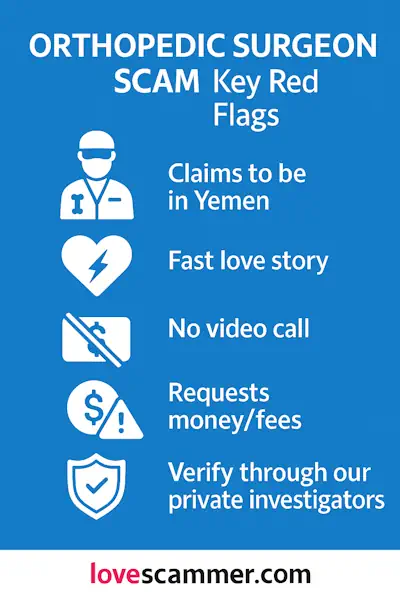United Nations Orthopedic Surgeon in Yemen May be Scammer

In recent years romance scams have been on the rise as more people are turning to online dating sites and social media to find love. Unfortunately scammers have seen this as an opportunity to prey on the vulnerable. One such scam is where a scammer poses as an orthopedic surgeon in Yemen.
How Scammers Pose as Surgeons
The scam goes like this. A woman meets a man online who claims to be an orthopedic surgeon. Over time the man builds an online relationship with her, often professing to be in love with her.
After a few weeks he starts to ask for money, citing medical expenses or emergencies. These scammers work hard to gain your trust, making their stories sound plausible and their pleas for help hard to resist.
But can you verify someone claiming to be a UN orthopedic surgeon in Yemen? Firstly be skeptical. Check his bio, photos and personal details for inconsistencies. If you’re not sure or want definitive answers, contact us. We can investigate the individual’s background and confirm if the surgeon or any other medical professional is legitimate. While this service has a cost, it gives you clarity and peace of mind.
Romance Scams and the Medical Profession
Romance scams come in many forms but they usually involve someone pretending to be a trustworthy figure to gain your trust and affection. Once you feel secure the scammer will usually ask for money or favors.
Scammers often adopt professions that are perceived as reputable, such as those in the medical field. Medical professionals, especially surgeons are seen as reliable and compassionate so it’s easier for scammers to gain your trust.
But remember this: a real orthopedic surgeon working in a war zone would have neither the time nor the inclination for online dating.

Scammers often use stolen photos, pretending to be the person in the images.
Real Case Study of Such a Fraud
Military Doctor Seeking Wife
My story starts in early December when Bentley Jones contacted me through a dating site. (Editor’s note: Scammers often reach out via social media platforms like Facebook or Instagram.)
He introduced himself as a Norwegian man living in Texas looking for a serious relationship. He said he was an orthopedic surgeon working for the UN.
He told me he was a U.S. military doctor stationed in Yemen. He explained that Doctors Without Borders (Médecins Sans Frontières MSF) worked in local hospitals, taking care of civilians, children and soldiers. He, too, was retiring in a few weeks. An orphan and widower-his wife had died of cancer a few years earlier-he had an 11-year-old son in boarding school and was looking for a new mother for him.
Editor’s note: Scammers use the same story, often posing as military doctors in Aleppo, Syria or other war zones.
We seemed to get on well and soon we exchanged email addresses. Our conversations moved quickly to Skype where we would spend hours listening to music together.
Although we talked extensively on Skype I could only hear his voice. Bentley said video calls were not allowed for security reasons. He said he would get in trouble with the UN if he allowed video calls from a war zone.
He talked about his tough work as a surgeon in Yemen. He told me about the soldiers he had treated and the emotional toll of losing patients, one of whom had died recently after an attack. His stories were so vivid I could almost smell the war.
The box with a lot of money appears
We quickly became romantic. Bentley started calling me “honey” and we grew closer. One day he told me a secret: He had a box full of US dollars, gold and important documents to open a private clinic when he retired.
The money, he said, was a reward from his deceased general for his good service. But the accounts in Yemen were frozen, and he couldn’t get the money until he left the military.
To keep the valuables safe, Bentley said the box was shipped to Ghana through the Red Cross using a company he trusted, Suntech Fast Delivering Service. His late general had recommended the company, which worked with the UN and the military.
The Request for Payment
Bentley told me the company didn’t have storage and insisted the box be sent to me directly. I trusted him and our future together so I agreed.
A few days later I got a request for $1,800 to cover the delivery cost, with promise the box would arrive within 48 hours. I managed to get the money and sent it through Western Union.
He said I would be paid once the box arrives. He even said he would give me the combination. A UN diplomat would contact me to coordinate the delivery.
The stories of the scammers
In order for the scammers to pretend to have any reason at all to ask for money, it is necessary to invent very special stories. Mostly it is about the fact that the man is supposedly travelling somewhere in the world on business and for various reasons cannot access his bulging account. That’s why he needs someone to bail him out and advance him the money. Of course, he wants to pay it back soon. But that never happens.
What reasons do the scammers give?
Here are some examples of typical stories that scammers tell their victims.
The Chief engineer of an oil rig south of Alabama
Mark David Bowman, dob 2/14/62. Supposedly the chief engineer of an oil rig south of Alabama. Originally born in Edinburgh, Scotland. Lives most of his life supposedly in Broomfield, CO. Father’s name is Wallis. Mark is divorced from Helen, they share a daughter together named Vanessa. He’s supposedly waiting on final inspection results so he can retire “and get a huge pay check and marry me, buy a house, make investments.”
He deep dives every Saturday afternoon to check the machines, and he can talk on the phone, but no video chat.
Eventually the story comes up: “My old company is paying me and I want you to accept the box with the money” story, but he doesn’t want it to go to Colorado where his ex would have access to it. And that’s where the problem comes in: the shipping company wants to charge me for the box. So this guy says he’ll come to NJ “in a few weeks” as long as I accept the box and pay the fees, since he doesn’t have access to his bank account.
Only: There is no box, no transport company and no money in the box. It’s all about depriving the victim of her savings.

Scammers often exploit fake package deliveries, using fabricated issues like unpaid taxes or customs problems to extort more money.
The First Problems with the Box
Two days later I got an email from the supposed diplomat who was supposed to be accompanying the box. He said he had landed at London Heathrow but had a problem. The critical documents were missing. An anti drug certificate and an anti terror document were required – both of which came with a price tag.
Bentley said this would be the last payment and not to jeopardize our future over what he called a small fee. My account was already overdrawn so I took out a loan, thinking once the box arrived all my financial problems would be solved.
After I paid the requested amount I got the forged certificates via email. But another problem arose. A missing stamp was holding up the shipment and I was asked to pay again.
Anti-Terror Document Crisis
The situation got worse when the box arrived in my country. A new email said local anti-drug and anti-terror documents were required. Three weeks had passed and the fees had gone up to $22,300.
I was panicked and I confided in Bentley who “negotiated” a reduction to $11,500. Even that was beyond my means. I managed to raise $5,000 and sent $2,000 via Western Union. Thankfully my bank rejected the remaining $3,000.
The diplomat was not deterred and asked me to ask friends or family for help. I refused and he suggested I send cash in a package. I declined.
Bentley’s Flight Plans
Bentley said his military contract was ending and he sent me his flight details. He was flying out of Riyadh and couldn’t get a flight from Sanaa because of the war.
But a quick check showed the distance between these two cities was over 800 miles – a journey he couldn’t possibly make in the time frame he gave me. I took two weeks off work to meet him at the airport and waited for hours for him to show up. I was worried, but I could not get any information from the airline. So I went back home.
The “Shooting” Incidents
Four days later I got an email from a “Major Raymond” saying Bentley had been shot in Yemen and needed surgery. The email was from a supposed Red Cross doctor who said Bentley was being treated by Doctors Without Borders.
Two days later I managed to talk to Bentley briefly. He was still focused on the box and how it was important for our future.
A Private Detective’s Intervention
I was exhausted by now. I confided in a friend and she told me about a similar case her aunt had gone through. She referred me to A Plus Detective Agency and they confirmed my worst fears – Bentley was a scammer.
After that I ignored the diplomat’s threats and cut off all communication with Bentley and his “doctor”. It was clear none of them were who they claimed to be.
The Aftermath: A Financial and Emotional Cost
I’m financially ruined. I’ll be paying off a five figure debt for years to come. Some may ask “How could you be so stupid?” But scammers use psychological tricks that can catch even the most cautious of us.
Scammers prey on emotions and exploit our desire for connection and love.
I have since read about the scammers’ modus operandi in other testimonials from scam victims on the detective agency’s website Lovescammer.com. After the alleged doctor was exposed as a love scammer, I wrote this article about the scam as a false doctor.
I can only warn all women not to get involved with men from foreign countries on the Internet. Love makes the victims blind. And the perpetrators deliberately take advantage of this.
So it was possible for me to give away a lot of money to foreign people and to go to my limits. Spurred on and motivated by a man who wanted to spend his future with me. Under normal circumstances, I would not have gotten involved.
A Warning to Others
My story is a warning. I advise others especially women to be careful with online relationships with strangers from foreign countries. Love can blind us to red flags and scammers know exactly how to use that to their advantage.
I wish I had found A Plus Detective Agency earlier. They could have saved me from this ordeal. But I learned too late that not everyone online is good.

Scammers typically have one goal: to exploit victims for financial gain.
Preventing Romance Scams
Romance scams are increasingly sophisticated, making prevention challenging but not impossible. By following a few essential guidelines, individuals can protect themselves from falling victim to these schemes.
Stay Cautious in Online Communication
The first and most crucial rule is to maintain caution when communicating with someone you’ve met online. Be wary if the relationship progresses too quickly or if the person begins requesting money or sensitive personal information. Scammers often appeal to emotions, creating an illusion of urgency or intimacy.
It’s vital to verify the person’s identity. This could involve conducting reverse image searches on their profile photos or checking whether their details align with official records. Trust your instincts—if something feels off, it probably is.
Educate Yourself on Scammer Tactics
Knowledge is a powerful defense. Romance scammers continually evolve their tactics, so staying informed about the latest methods is essential. Common red flags include:
- Requests for financial assistance under emotional pretenses.
- Elaborate stories involving military deployments or emergency situations.
- Refusal to meet in person or video call despite lengthy communication.
These scams often start subtly but escalate once trust is established. Recognizing early signs can prevent significant losses.
Red Flags of Military Romance Scams
A prevalent form of romance scam involves fraudsters posing as military personnel or doctors in conflict zones. Known as Military Romance Scams, these operations prey on the goodwill and trust of their victims. Authentic military members or humanitarian workers, such as those affiliated with Doctors Without Borders, never solicit money from strangers online.
Common Scammer Claims
Fraudsters often craft scenarios requiring urgent financial assistance. Beware if they request money for:
- Fictitious medical procedures.
- Transportation or relocation expenses.
- Supposed medical or communication fees.
- Marriage license processing costs.
Requests for payment via untraceable methods—such as wire transfers, cryptocurrencies, or gift cards—are particularly suspicious.

Protect Yourself and Take Action
If you’ve met someone online and suspect their intentions, the best course of action is to remain skeptical. Never send money to someone you haven’t met in person.
For those already entangled in suspicious relationships, private investigators can provide valuable assistance. At A Plus Detective Agency, we specialize in uncovering the truth. Our team can verify identities, expose fraudulent schemes, and offer the peace of mind you deserve.
Secure Your Peace of Mind — Contact Us Today
Your information will not be shared with third parties unless you give explicit consent.
For more details, please refer to our Privacy Policy
By submitting this message, I confirm that I have read and understood the privacy policy and consent to the electronic processing of my personal data for the purpose of establishing contact.
More related articles:
